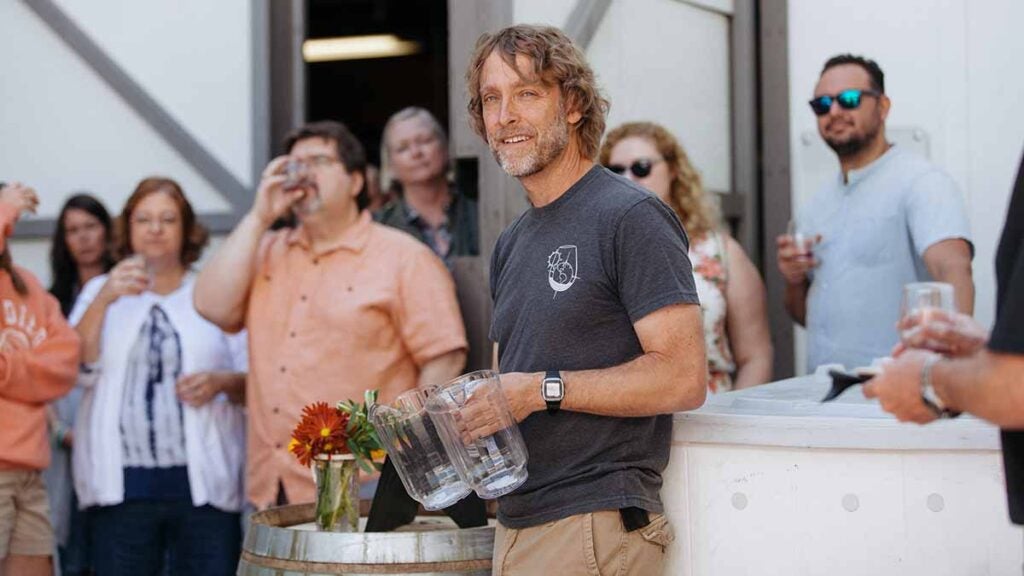Harvesting savings: How a rural Arizona winery navigates sustainable growth with federal grants

Eric Glomski and his family opened Page Spring Cellars twenty years ago with an eye towards a sustainable future for generations to come — while looking out for his business’ bottom line. “Obviously there’s always this tough balancing act between making a business work financially and trying to push forward and embrace your environmental ethics. We’re looking for a balance between our environmental commitment and that business profitability perspective,” Glomski explained.
Glomski, who previously worked professionally as a restoration and river ecologist, has made significant progress toward solving those issues within his family-owned business — using tactics that he knows suit his rural community best. “I’ve always had a very strong conservation ethic,” Glomski said. “And over time, we have really chipped away at that challenge.”
Page Springs Cellars has installed solar panels to reduce energy costs, developed on-site waste processing features, and uses solar-powered well pumps to produce their grapes in the region’s arid climate.
One key tool that has helped the winery to afford their growth and development has been installing solar panels through a federal grant program, the U.S. Department of Agriculture’s Rural Energy for America Program (REAP). REAP pays farmers and rural small businesses like Page Springs Cellars to support clean energy systems and energy efficiency projects. Congress passed the Inflation Reduction Act in 2022, providing a huge boost for REAP and delivering larger grants and billions to fund thousands of projects all across rural America.
“We couldn’t afford to put in the photovoltaics,” during the early days of building their business, Glomski said. “It’s a good investment over time, of course, but we just couldn’t afford to take that upfront hit. Starting out, it’s always about cash flow. Sure, you’ll save money over the longer term, but making that initial investment is tough.”
“Then we found out about the REAP grant, and after we did the math our payback period dropped down to around 5 to 7 years depending on our usage and output,” Glomski said. “Well, when you start talking about a five-year payback, that’s something that is easier to get people to buy into. The REAP grant helped us to offset some of those upfront costs, and that defrayed cost meant our investment made sense. It’s been a very good thing for building our business.”
Since then, Glomski and Page Springs Cellars have received additional REAP grants to make their business more efficient and profitable. In addition to their winery, they’ve put in solar arrays where they grow some of their grapes in the Chiricahua Mountains of Southeastern Arizona.
“It’s an extremely remote site,” Glomski said. “We’ve installed 2 arrays there with REAP—one for the house where myself and my employees live when we’re working down there. And one for our barn and well pump. That has worked amazingly well for us.”
The innovative wine business has additional pending REAP grants for battery storage systems to help manage regular power outages that have a serious impact on their business. “If we have a power outage on a Saturday during the season, that’s $15,000 we lose,” Glomski said.
Glomski also received support from Solar United Neighbors (SUN)’s Ready, Set, Solar! For Rural Businesses Program. The 10-week program helps walk farmers and rural small business owners through the REAP application process. SUN is dedicated to helping anyone who’s overwhelmed by the prospect of going solar with real life examples, credible information, and personalized experience.”
Glomski said that he sees real potential for other farmers and rural small businesses to benefit from clean energy and energy efficiency technologies. “To me, in these rural areas I would love to see every farm, every well in this state on solar rather than diesel,” Glomski said.
“Once you get people to start adopting solar, using less energy to pump water, that could lead to some real momentum,” Glomski said. “I think one use of positive green technology begets another. We shouldn’t underestimate the value of the kind of domino effect. REAP could, with some additional education and support, really reach a lot of people and make a lot of positive change in our rural regions.”
Farmers and rural small businesses can learn more and apply for REAP through their state Rural Development office.
The Inflation Reduction Act (IRA) was an incentive package passed by the 117th U.S. Congress designed to reduce inflation, reduce drug prices, reduce climate emissions, and fund clean energy production. The IRA was signed into law in August 2022 by President Joe Biden. The legislation included a significant boost in funding and availability of REAP grants for farmers and rural small businesses.
